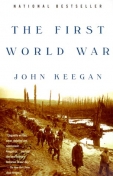BKMT READING GUIDES
The First World War
by John Keegan
Paperback : 528 pages
0 club reading this now
0 members have read this book
Introduction
(The First World War created the modern world. A conflict of unprecedented ferocity, it abruptly ended the relative peace and prosperity of the Victorian era, unleashing such demons of the twentieth century as mechanized warfare and mass death. It also helped to usher in the ideas that have shaped our times--modernism in the arts, new approaches to psychology and medicine, radical thoughts about economics and society--and in so doing shattered the faith in rationalism and liberalism that had prevailed in Europe since the Enlightenment. With The First World War, John Keegan, one of our most eminent military historians, fulfills a lifelong ambition to write the definitive account of the Great War for our generation.
Probing the mystery of how a civilization at the height of its achievement could have propelled itself into such a ruinous conflict, Keegan takes us behind the scenes of the negotiations among Europe's crowned heads (all of them related to one another by blood) and ministers, and their doomed efforts to defuse the crisis. He reveals how, by an astonishing failure of diplomacy and communication, a bilateral dispute grew to engulf an entire continent.
But the heart of Keegan's superb narrative is, of course, his analysis of the military conflict. With unequalled authority and insight, he recreates the nightmarish engagements whose names have become legend--Verdun, the Somme and Gallipoli among them--and sheds new light on the strategies and tactics employed, particularly the contributions of geography and technology. No less central to Keegan's account is the human aspect. He acquaints us with the thoughts of the intriguing personalities who oversaw the tragically unnecessary catastrophe--from heads of state like Russia's hapless tsar, Nicholas II, to renowned warmakers such as Haig, Hindenburg and Joffre. But Keegan reserves his most affecting personal sympathy for those whose individual efforts history has not recorded--"the anonymous millions, indistinguishably drab, undifferentially deprived of any scrap of the glories that by tradition made the life of the man-at-arms tolerable."
By the end of the war, three great empires--the Austro-Hungarian, the Russian and the Ottoman--had collapsed. But as Keegan shows, the devastation ex-tended over the entirety of Europe, and still profoundly informs the politics and culture of the continent today. His brilliant, panoramic account of this vast and terrible conflict is destined to take its place among the classics of world history.
With 24 pages of photographs, 2 endpaper maps, and 15 maps in text
Despite the avalanche of books written about the First World War in recent years, there have been comparatively few books that deliver a comprehensive account of the war and its campaigns from start to finish. The First World War fills the gap superbly. As readers familiar with Keegan's previous books (including The Second World War and Six Armies in Normandy) know, he's a historian of the old school. He has no earth-shattering new theories to challenge the status quo, no first-person accounts to tug on the emotions--what he does have, though, is a gift for talking the lay person through the twists and turns of a complex narrative in a way that is never less than accessible or engaging.
Keegan never tries to ram his learning down your throat. Where other authors have struggled to explain how Britain could ever allow itself to be dragged into such a war in 1914, Keegan keeps his account practical. The level of communications that we enjoy today just didn't exist then, and so it was much harder to keep track of what was going on. By the time a message had finally reached the person in question, the situation may have changed out of all recognition. Keegan applies this same "cock-up" theory of history to the rest of the war, principally the three great disasters at Gallipoli, the Somme, and Passchendaele. The generals didn't send all those troops to their deaths deliberately, Keegan argues; they did it out of incompetence and ineptitude, and because they had no idea of what was actually going on at the front.
While The First World War is not afraid to point the finger at those generals who deserve it, even Keegan has to admit he doesn't have all the answers. If it all seems so obviously futile and such a massive waste of life now, he asks, how could it have seemed worthwhile back then? Why did so many people carry on, knowing they would die? Why, indeed. --John Crace, Amazon.co.uk
Discussion Questions
No discussion questions at this time.Book Club Recommendations
Recommended to book clubs by 0 of 0 members.
Book Club HQ to over 90,000+ book clubs and ready to welcome yours.
Get free weekly updates on top club picks, book giveaways, author events and more








